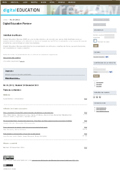Computer assisted language learning and the internationalisation of the Portuguese language in higher education contexts
Article Sidebar

Main Article Content
Ana Sevilla-Pavón
The internationalisation of the Portuguese language has become a priority for academic institutions of different Portuguese-speaking countries which are trying to adapt to the current context of globalisation and ubiquitous communications through digital media. In order to achieve it, several challenges should be faced, namely providing international students with resources aimed at helping them improve their Portuguese while fostering its use in academic and scientific contexts. This can be done by identifying, creating and editing high-quality teaching materials which bear in mind the sociocultural, political, economic and linguistic contexts; using the Information and Communication Technologies effectively in both face-to-face and online learning environments (International Institute of the Portuguese Language, 2010); and promoting the online learning of Portuguese as a Foreign Language in higher education settings through virtual learning environments. This paper explores the challenges brought about by the internationalisation of Portuguese and how computer assisted language learning - and, more specifically, the development of a virtual learning environment aiming at catering for the linguistic needs of international students in different institutions in Brazil, Portugal and elsewhere - could help face these challenges.
Palabras clave
Internationalisation, Portuguese as a foreign language, virtual learning environment, computer-assisted languague learning, higher education
Article Details
Cómo citar
Sevilla-Pavón, Ana. «Computer assisted language learning and the internationalisation of the Portuguese language in higher education contexts». Digital Education Review, n.º 28, pp. 37-44, https://raco.cat/index.php/DER/article/view/302808.
Derechos
Derechos de autor
El/la autor/a que publica en esta revista está de acuerdo con los términos siguientes:
- El/la autor/a conserva los derechos de autoría y otorga a la revista el derecho de primera publicación de la obra
- Los textos publicados en Digital Education Review están bajo una licencia Reconocimiento-No comercial-Sin obras derivadas 3.0 España de Creative Commons.
- Para poder mencionar los trabajos se debe citar la fuente (DER) y el autor del texto.
- Digital Education Review (DER) no acepta ninguna responsabilidad por los puntos de vista y las declaraciones hechas por los autores en su trabajo.